新视野第三版大学英语第二册课文翻译
新视野第三版大学英语第二册课文翻译

新视野大学英语第二册读写教程课文翻译Unit 1 Text A An impressive Engli lsesson标题: 一堂难忘的英语课1. 如果我是唯一一个还在纠正小孩英语的家长,那么我儿子也许是对的。
对他而言,我是一个乏味的怪物:一个他不得不听其教诲的父亲,一个还沉湎于语法规则的人,对此我儿子似乎颇为反感。
2. 我觉得我是在最近偶遇我以前的一位学生时,才开始对这个问题认真起来的。
这个学生刚从欧洲旅游回来。
我满怀着诚挚期待问她:“欧洲之行如何?”3. 她点了三四下头,绞尽脑汁,苦苦寻找恰当的词语,然后惊呼:“真是,哇!”4. 没了。
所有希腊文明和罗马建筑的辉煌居然囊括于一个浓缩的、不完整的语句之中!我的学生以“哇!”来表示她的惊叹,我只能以摇头表达比之更强烈的忧虑。
5. 关于正确使用英语能力下降的问题,有许多不同的故事。
学生的确本应该能够区分诸如 their/there/they're 之间的不同,或区别 complimentary 跟complementary 之间显而易见的差异。
由于这些知识缺陷,他们承受着大部分不该承受的批评和指责,因为舆论认为他们应该学得更好。
6. 学生并不笨,他们只是被周围所看到和听到的语言误导了。
举例来说,杂货店的指示牌会把他们引向 stationary(静止处),虽然便笺本、相册、和笔记本等真正的 stationery(文具用品)并没有被钉在那儿。
朋友和亲人常宣称 They've just ate。
实际上,他们应该说 They've just eaten。
因此,批评学生不合乎清理。
7. 对这种缺乏语言功底而引起的负面指责应归咎于我们的学校。
学校应对英语熟练程度制定出更高的标准。
可相反,学校只教零星的语法,高级词汇更是少之又少。
还有就是,学校的年轻教师显然缺乏这些重要的语言结构方面的知识,因为他们过去也没接触过。
学校有责任教会年轻人进行有效的语言沟通,可他们并没把语言的基本框架一一准确的语法和恰当的词汇一一充分地传授给学生。
新视野大学英语第三版读写教程第二册Unit1课文翻译
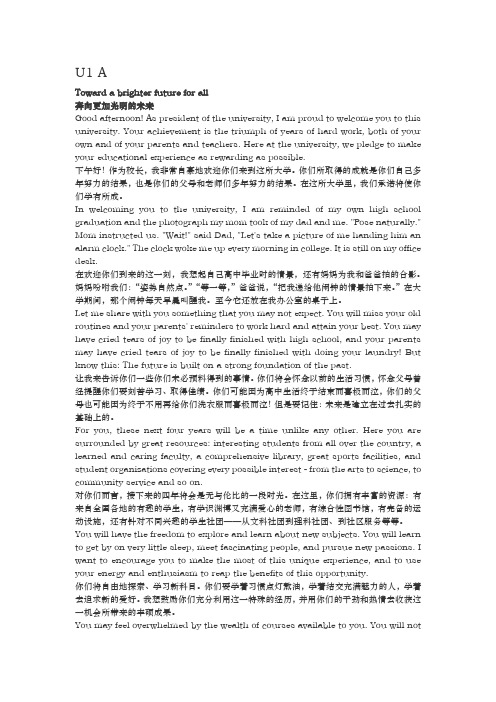
U1 AToward a brighter future for all奔向更加光明的未来Good afternoon! As president of the university, I am proud to welcome you to this university. Your achievement is the triumph of years of hard work, both of your own and of your parents and teachers. Here at the university, we pledge to make your educational experience as rewarding as possible.下午好!作为校长,我非常自豪地欢迎你们来到这所大学。
你们所取得的成就是你们自己多年努力的结果,也是你们的父母和老师们多年努力的结果。
在这所大学里,我们承诺将使你们学有所成。
In welcoming you to the university, I am reminded of my own high school graduation and the photograph my mom took of my dad and me. "Pose naturally." Mom instructed us. "Wait!" said Dad, "Let's take a picture of me handing him an alarm clock." The clock woke me up every morning in college. It is still on my office desk.在欢迎你们到来的这一刻,我想起自己高中毕业时的情景,还有妈妈为我和爸爸拍的合影。
新视野大学英语第三版第二册U1课文原文+翻译
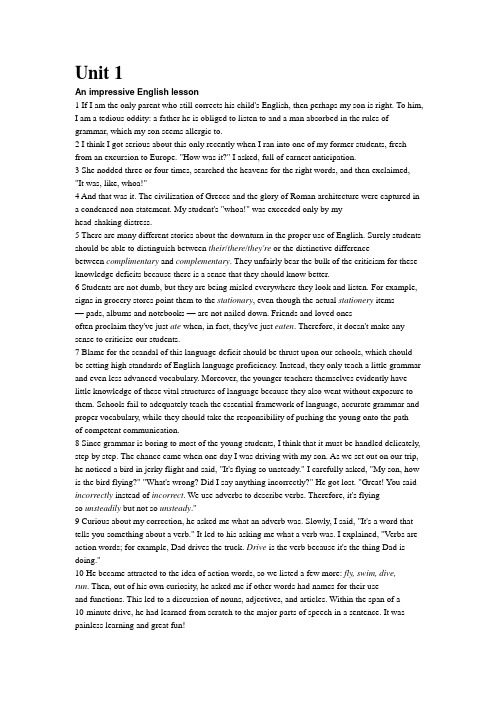
Unit 1An impressive English lesson1 If I am the only parent who still corrects his child's English, then perhaps my son is right. To him,I am a tedious oddity: a father he is obliged to listen to and a man absorbed in the rules of grammar, which my son seems allergic to.2 I think I got serious about this only recently when I ran into one of my former students, fresh from an excursion to Europe. "How was it?" I asked, full of earnest anticipation.3 She nodded three or four times, searched the heavens for the right words, and then exclaimed, "It was, like, whoa!"4 And that was it. The civilization of Greece and the glory of Roman architecture were captured ina condensed non-statement. My student's "whoa!" was exceeded only by myhead-shaking distress.5 There are many different stories about the downturn in the proper use of English. Surely students should be able to distinguish between their/there/they're or the distinctive differencebetween complimentary and complementary. They unfairly bear the bulk of the criticism for these knowledge deficits because there is a sense that they should know better.6 Students are not dumb, but they are being misled everywhere they look and listen. For example, signs in grocery stores point them to the stationary, even though the actual stationery items— pads, albums and notebooks — are not nailed down. Friends and loved onesoften proclaim they've just ate when, in fact, they've just eaten. Therefore, it doesn't make any sense to criticize our students.7 Blame for the scandal of this language deficit should be thrust upon our schools, which should be setting high standards of English language proficiency. Instead, they only teach a little grammar and even less advanced vocabulary. Moreover, the younger teachers themselves evidently have little knowledge of these vital structures of language because they also went without exposure to them. Schools fail to adequately teach the essential framework of language, accurate grammar and proper vocabulary, while they should take the responsibility of pushing the young onto the pathof competent communication.8 Since grammar is boring to most of the young students, I think that it must be handled delicately, step by step. The chance came when one day I was driving with my son. As we set out on our trip, he noticed a bird in jerky flight and said, "It's flying so unsteady." I carefully asked, "My son, how is the bird flying?" "What's wrong? Did I say anything incorrectly?" He got lost. "Great! You said incorrectly instead of incorrect. We use adverbs to describe verbs. Therefore, it's flyingso unsteadily but not so unsteady."9 Curious about my correction, he asked me what an adverb was. Slowly, I said, "It's a word that tells you something about a verb." It led to his asking me what a verb was. I explained, "Verbs are action words; for example, Dad drives the truck. Drive is the verb because it's the thing Dad is doing."10 He became attracted to the idea of action words, so we listed a few more: fly, swim, dive,run. Then, out of his own curiosity, he asked me if other words had names for their useand functions. This led to a discussion of nouns, adjectives, and articles. Within the span of a10-minute drive, he had learned from scratch to the major parts of speech in a sentence. It was painless learning and great fun!11 Perhaps, language should be looked upon as a road map and a valuable possession: often study the road map (check grammar) and tune up the car engine (adjust vocabulary). Learning grammar and a good vocabulary is just like driving with a road map in a well-conditioned car.12 The road map provides the framework and guidance you need for your trip, but it won't tell you exactly what trees or flowers you will see, what kind of people you will encounter, or what types of feelings you will be experiencing on your journey. Here, the vocabulary makes the journey's true colors come alive! A good vocabulary enables you to enjoy whatever you see as you drive along. Equipped with grammar and a good vocabulary, you have flexibility and excellent control. While the road map guides your journey to your destination, an excellent vehicle helps you to fully enjoy all of the sights, sounds and experiences along the way.13 Effective, precise, and beneficial communication depends upon grammar and a good vocabulary, the two essential assets for students, but they are not being taught in schools.14 Just this morning, my son and I were eating breakfast when I attempted to add milk to my tea. "Dad," he said, "If I were you, I wouldn't do that. It's sour."15 "Oh my!" I said, swelling with pride toward my son, "That's a grammatically perfect sentence. You used were instead of was."16 "I know, I know," he said with a long agreeable sigh. "It's the subjunctive mood."17 I was, like, whoa!Translation一堂难忘的英语课1 如果我是唯一一个还在纠正小孩英语的家长,那么我儿子也许是对的。
大学新视野英语第三版Unit2课文+翻译

A游泳恐惧1 当时我和朋友正在法国旅行,我们把汽车停在海滩,眼前就是地中海。
巨浪翻滚击打着构筑起防波堤的偌大岩石。
人们说这里的海滩以其可怕的裂流而著称。
恐惧让我不寒而栗。
没有什么比水让我更害怕了。
2 只是看到了海就已经让我觉得反胃。
3 我曾经一直都是喜欢水的,并且直到去年夏天我都还是一名游泳好手。
那时,我决定爬上游泳池边上最高的跳板来跳水。
我从那么高的地方跳下,重重地撞击到水面上。
我肺里的空气一下子全被挤出去了,马上不省人事。
醒来时发现哥哥正把我虚弱的身体从游泳池里拖出来。
从那时起,我对水的恐惧就没有消退过,我怕极了水。
4 “贾森,你要过来吗?”我的朋友马特朝我喊道。
5 我说:“好,就是欣赏一下景色”,又在心里默默加了一句——在岸上欣赏。
担心如果他们知道我害怕水而可怜我。
6 突然,我听到有人用法语喊叫。
接着看见一群人没脱衣服,就冲到海里。
我心想,这真是太奇怪了。
7 我瞥见防波堤尽头的海浪中有个东西在上下浮动。
我惊恐地意识到大事不妙,倒吸了一口凉气,那居然是个小男孩!前去救落水男童的人们搏击着海浪,但情况却不乐观。
由于水的拉拽,他们根本不可能及时游到小男孩身边。
8 我扭头看看那小男孩。
他的头刚露出水面,然后一个浪头打过来,好一阵不见踪影——我不得不做点什么了。
9 我估计了当下的情形后注意到了——对,那防波堤!小男孩靠近那个地方,也许我可以从那儿帮忙。
我冲下海滩,跑上防波堤,但突然我想起了什么——水!顿时有了恐惧的症状:我手心冒汗,胃里感觉不适。
我一下子停下来。
10 水里的那些人低估了海浪的威力,救援工作没有任何进展。
只有我注意到了跑到防波堤上是到达溺水男童的最快的路径。
然而在此性命攸关之际,我极度恐慌。
我努力去回想十几岁时所接受的救生员训练。
11 我因恐惧而全身瘫软,但我强迫自己向前移动,展开这场突发的救援行动。
我不想做这些,在我施救之前肯定会有别人救他吧。
12 我在防波堤的边上迅速转过身来,深信会看见某个游泳健将正向着小男孩劈波斩浪。
第三版新视野大学英语2文章翻译
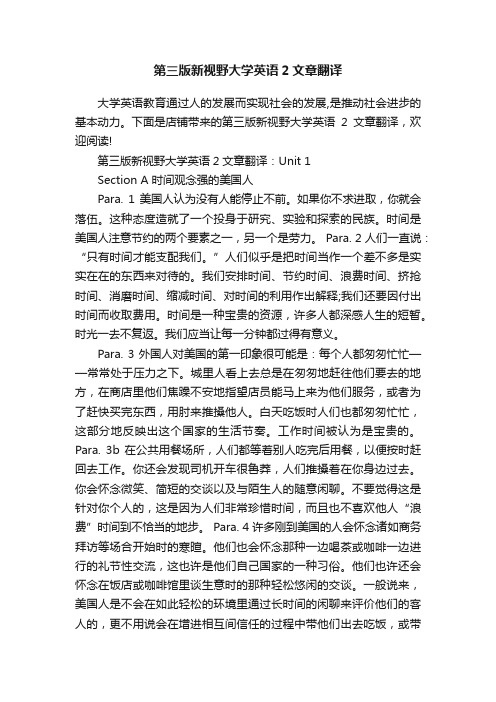
第三版新视野大学英语2文章翻译大学英语教育通过人的发展而实现社会的发展,是推动社会进步的基本动力。
下面是店铺带来的第三版新视野大学英语2文章翻译,欢迎阅读!第三版新视野大学英语2文章翻译:Unit 1Section A 时间观念强的美国人Para. 1 美国人认为没有人能停止不前。
如果你不求进取,你就会落伍。
这种态度造就了一个投身于研究、实验和探索的民族。
时间是美国人注意节约的两个要素之一,另一个是劳力。
Para. 2 人们一直说:“只有时间才能支配我们。
”人们似乎是把时间当作一个差不多是实实在在的东西来对待的。
我们安排时间、节约时间、浪费时间、挤抢时间、消磨时间、缩减时间、对时间的利用作出解释;我们还要因付出时间而收取费用。
时间是一种宝贵的资源,许多人都深感人生的短暂。
时光一去不复返。
我们应当让每一分钟都过得有意义。
Para. 3 外国人对美国的第一印象很可能是:每个人都匆匆忙忙——常常处于压力之下。
城里人看上去总是在匆匆地赶往他们要去的地方,在商店里他们焦躁不安地指望店员能马上来为他们服务,或者为了赶快买完东西,用肘来推搡他人。
白天吃饭时人们也都匆匆忙忙,这部分地反映出这个国家的生活节奏。
工作时间被认为是宝贵的。
Para. 3b 在公共用餐场所,人们都等着别人吃完后用餐,以便按时赶回去工作。
你还会发现司机开车很鲁莽,人们推搡着在你身边过去。
你会怀念微笑、简短的交谈以及与陌生人的随意闲聊。
不要觉得这是针对你个人的,这是因为人们非常珍惜时间,而且也不喜欢他人“浪费”时间到不恰当的地步。
Para. 4 许多刚到美国的人会怀念诸如商务拜访等场合开始时的寒暄。
他们也会怀念那种一边喝茶或咖啡一边进行的礼节性交流,这也许是他们自己国家的一种习俗。
他们也许还会怀念在饭店或咖啡馆里谈生意时的那种轻松悠闲的交谈。
一般说来,美国人是不会在如此轻松的环境里通过长时间的闲聊来评价他们的客人的,更不用说会在增进相互间信任的过程中带他们出去吃饭,或带他们去打高尔夫球。
新视野大学英语第三版读写教程第二册课文翻译
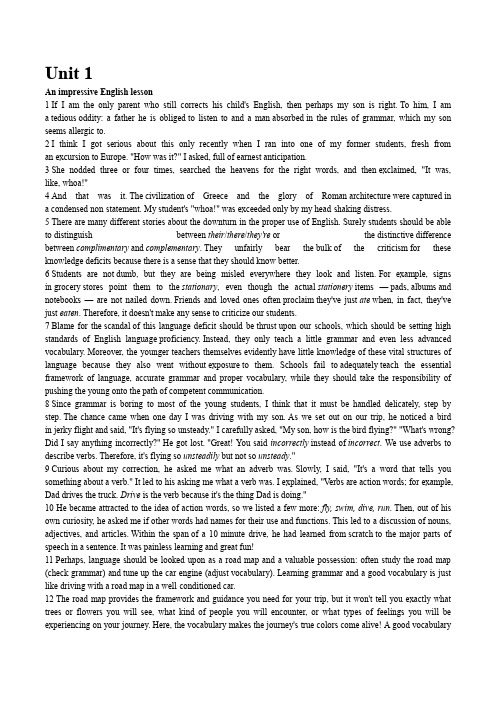
Unit 1An impressive English lesson1If I am the only parent who still corrects his child's English, then perhaps my son is right.To him, I am a tedious oddity: a father he is obliged to listen to and a man absorbed in the rules of grammar, which my son seems allergic to.2I think I got serious about this only recently when I ran into one of my former students, fresh from an excursion to Europe."How was it?" I asked, full of earnest anticipation.3She nodded three or four times, searched the heavens for the right words, and then exclaimed, "It was, like,whoa!"4And that was it.The civilization of Greece and the glory of Roman architecture were captured in a condensed non-statement.My student's "whoa!" was exceeded only by my head-shaking distress.5There are many different stories about the downturn in the proper use of English.Surely students should be able to distinguish between their/there/they're or the distinctive difference between complimentary and complementary.They unfairly bear the bulk of the criticism for these knowledge deficits because there is a sense that they should know better.6Students are not dumb, but they are being misled everywhere they look and listen.For example, signs in grocery stores point them to the stationary, even though the actual stationery items —pads,albums and notebooks — are not nailed down.Friends and loved ones often proclaim they've just ate when, in fact, they've just eaten.Therefore, it doesn't make any sense to criticize our students.7Blame for the scandal of this language deficit should be thrust upon our schools, which should be setting high standards of English language proficiency.Instead, they only teach a little grammar and even less advanced vocabulary.Moreover, the younger teachers themselves evidently have little knowledge of these vital structures of language because they also went without exposure to them. Schools fail to adequately teach the essential framework of language, accurate grammar and proper vocabulary, while they should take the responsibility of pushing the young onto the path of competent communication.8Since grammar is boring to most of the young students, I think that it must be handled delicately, step by step.The chance came when one day I was driving with my son.As we set out on our trip, he noticed a bird in jerky flight and said, "It's flying so unsteady."I carefully asked, "My son, how is the bird flying?""What's wrong? Did I say anything incorrectly?"He got lost."Great! You said incorrectly instead of incorrect. We use adverbs to describe verbs. Therefore, it's flying so unsteadily but not so unsteady."9Curious about my correction, he asked me what an adverb was.Slowly, I said, "It's a word that tells you something about a verb."It led to his asking me what a verb was.I explained, "Verbs are action words; for example, Dad drives the truck.Drive is the verb because it's the thing Dad is doing."10 He became attracted to the idea of action words, so we listed a few more:fly, swim, dive, run.Then, out of his own curiosity, he asked me if other words had names for their use and functions.This led to a discussion of nouns, adjectives, and articles.Within the span of a 10-minute drive, he had learned from scratch to the major parts of speech in a sentence.It was painless learning and great fun!11Perhaps, language should be looked upon as a road map and a valuable possession: often study the road map (check grammar) and tune up the car engine (adjust vocabulary).Learning grammar and a good vocabulary is just like driving with a road map in a well-conditioned car.12The road map provides the framework and guidance you need for your trip, but it won't tell you exactly what trees or flowers you will see, what kind of people you will encounter, or what types of feelings you will be experiencing on your journey.Here, the vocabulary makes the journey's true colors come alive!A good vocabularyenables you to enjoy whatever you see as you drive along.Equipped with grammar and a good vocabulary, you have flexibility and excellent control.While the road map guides your journey to your destination, an excellent vehicle helps you to fully enjoy all of the sights, sounds and experiences along the way.13Effective,precise, and beneficial communication depends upon grammar and a good vocabulary, the two essential assets for students, but they are not being taught in schools.14Just this morning, my son and I were eating breakfast when I attempted to add milk to my tea."Dad," he said, "If I were you, I wouldn't do that. It's sour."15"Oh my!"I said, swelling with pride toward my son, "That's a grammatically perfect sentence. You used were instead of was."16"I know, I know," he said with a long agreeable sigh. "It's the subjunctive mood."17I was, like, whoa!Translation一堂难忘的英语课1 如果我是唯一一个还在纠正小孩英语的家长,那么我儿子也许是对的。
新视野大学英语第三版读写教程第二册Unit1课文翻译.doc
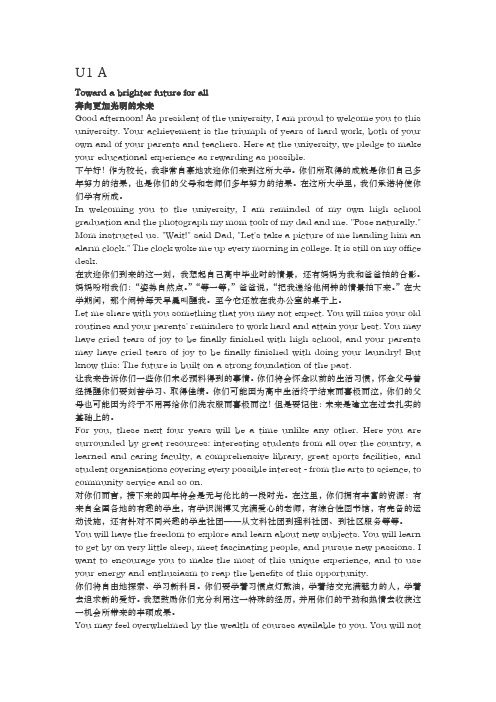
U1 AToward a brighter future for all奔向更加光明的未来Good afternoon! As president of the university, I am proud to welcome you to this university. Your achievement is the triumph of years of hard work, both of your own and of your parents and teachers. Here at the university, we pledge to make your educational experience as rewarding as possible.下午好!作为校长,我非常自豪地欢迎你们来到这所大学。
你们所取得的成就是你们自己多年努力的结果,也是你们的父母和老师们多年努力的结果。
在这所大学里,我们承诺将使你们学有所成。
In welcoming you to the university, I am reminded of my own high school graduation and the photograph my mom took of my dad and me. "Pose naturally." Mom instructed us. "Wait!" said Dad, "Let's take a picture of me handing him an alarm clock." The clock woke me up every morning in college. It is still on my office desk.在欢迎你们到来的这一刻,我想起自己高中毕业时的情景,还有妈妈为我和爸爸拍的合影。
新视野大学英语第三版读写教程第二册Unit2课文及翻译
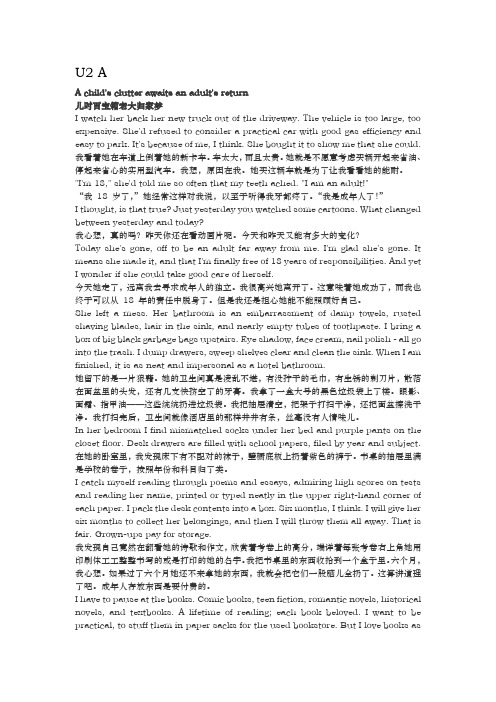
U2 AA child's clutter awaits an adult's return儿时百宝箱老大归家梦I watch her back her new truck out of the driveway. The vehicle is too large, too expensive. She'd refused to consider a practical car with good gas efficiency and easy to park. It's because of me, I think. She bought it to show me that she could. 我看着她在车道上倒着她的新卡车。
车太大,而且太贵。
她就是不愿意考虑买辆开起来省油、停起来省心的实用型汽车。
我想,原因在我。
她买这辆车就是为了让我看看她的能耐。
"I'm 18," she'd told me so often that my teeth ached. "I am an adult!"“我18 岁了,”她经常这样对我说,以至于听得我牙都疼了。
“我是成年人了!”I thought, is that true? Just yesterday you watched some cartoons. What changed between yesterday and today?我心想,真的吗?昨天你还在看动画片呢。
今天和昨天又能有多大的变化?Today she's gone, off to be an adult far away from me. I'm glad she's gone. It means she made it, and that I'm finally free of 18 years of responsibilities. And yet I wonder if she could take good care of herself.今天她走了,远离我去寻求成年人的独立。
新视野大学英语(第三版)读写教程第(二)册课文翻译 text A
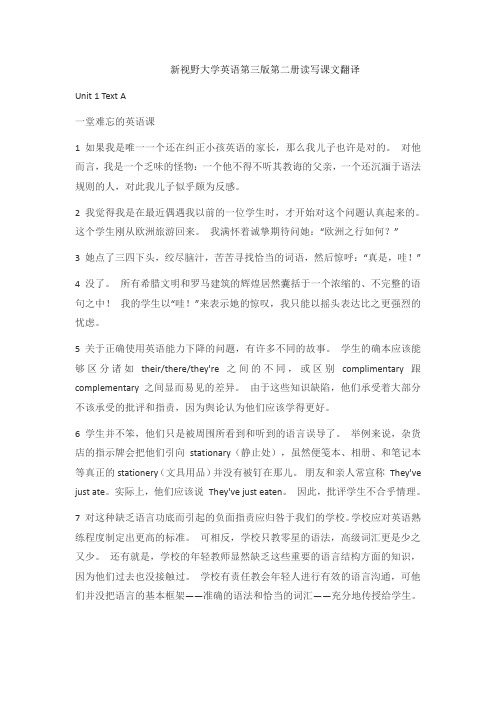
新视野大学英语第三版第二册读写课文翻译Unit 1 Text A一堂难忘的英语课1 如果我是唯一一个还在纠正小孩英语的家长,那么我儿子也许是对的。
对他而言,我是一个乏味的怪物:一个他不得不听其教诲的父亲,一个还沉湎于语法规则的人,对此我儿子似乎颇为反感。
2 我觉得我是在最近偶遇我以前的一位学生时,才开始对这个问题认真起来的。
这个学生刚从欧洲旅游回来。
我满怀着诚挚期待问她:“欧洲之行如何?”3 她点了三四下头,绞尽脑汁,苦苦寻找恰当的词语,然后惊呼:“真是,哇!”4 没了。
所有希腊文明和罗马建筑的辉煌居然囊括于一个浓缩的、不完整的语句之中!我的学生以“哇!”来表示她的惊叹,我只能以摇头表达比之更强烈的忧虑。
5 关于正确使用英语能力下降的问题,有许多不同的故事。
学生的确本应该能够区分诸如their/there/they're之间的不同,或区别complimentary 跟complementary之间显而易见的差异。
由于这些知识缺陷,他们承受着大部分不该承受的批评和指责,因为舆论认为他们应该学得更好。
6 学生并不笨,他们只是被周围所看到和听到的语言误导了。
举例来说,杂货店的指示牌会把他们引向stationary(静止处),虽然便笺本、相册、和笔记本等真正的stationery(文具用品)并没有被钉在那儿。
朋友和亲人常宣称They've just ate。
实际上,他们应该说They've just eaten。
因此,批评学生不合乎情理。
7 对这种缺乏语言功底而引起的负面指责应归咎于我们的学校。
学校应对英语熟练程度制定出更高的标准。
可相反,学校只教零星的语法,高级词汇更是少之又少。
还有就是,学校的年轻教师显然缺乏这些重要的语言结构方面的知识,因为他们过去也没接触过。
学校有责任教会年轻人进行有效的语言沟通,可他们并没把语言的基本框架——准确的语法和恰当的词汇——充分地传授给学生。
8 因为语法对大多数年轻学生而言枯燥且乏味,所以我觉得讲授语法得一步一步、注重技巧地进行。
新视野大学英语第三版第二册U2课文原文+翻译
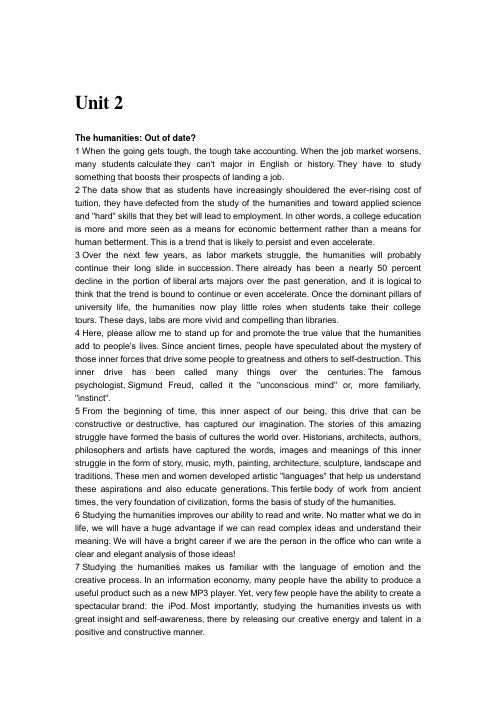
Unit 2The humanities: Out of date?1 When the going gets tough, the tough take accounting. When the job market worsens, many students calculate they can't major in English or history. They have to study something that boosts their prospects of landing a job.2 The data show that as students have increasingly shouldered the ever-rising cost of tuition, they have defected from the study of the humanities and toward applied science and "hard" skills that they bet will lead to employment. In other words, a college education is more and more seen as a means for economic betterment rather than a means for human betterment. This is a trend that is likely to persist and even accelerate.3 Over the next few years, as labor markets struggle, the humanities will probably continue their long slide in succession. There already has been a nearly 50 percent decline in the portion of liberal arts majors over the past generation, and it is logical to think that the trend is bound to continue or even accelerate. Once the dominant pillars of university life, the humanities now play little roles when students take their college tours. These days, labs are more vivid and compelling than libraries.4 Here, please allow me to stand up for and promote the true value that the humanities add to people's lives. Since ancient times, people have speculated about the mystery of those inner forces that drive some people to greatness and others to self-destruction. This inner drive has been called many things over the centuries. The famous psychologist, Sigmund Freud, called it the "unconscious mind" or, more familiarly, "instinct".5 From the beginning of time, this inner aspect of our being, this drive that can be constructive or destructive, has captured our imagination. The stories of this amazing struggle have formed the basis of cultures the world over. Historians, architects, authors, philosophers and artists have captured the words, images and meanings of this inner struggle in the form of story, music, myth, painting, architecture, sculpture, landscape and traditions. These men and women developed artistic "languages" that help us understand these aspirations and also educate generations. This fertile body of work from ancient times, the very foundation of civilization, forms the basis of study of the humanities.6 Studying the humanities improves our ability to read and write. No matter what we do in life, we will have a huge advantage if we can read complex ideas and understand their meaning. We will have a bright career if we are the person in the office who can write a clear and elegant analysis of those ideas!7 Studying the humanities makes us familiar with the language of emotion and the creative process. In an information economy, many people have the ability to produce a useful product such as a new MP3 player. Yet, very few people have the ability to create a spectacular brand: the iPod. Most importantly, studying the humanities invests us with great insight and self-awareness, there by releasing our creative energy and talent in a positive and constructive manner.8 Perhaps the best argument in favor of the humanities is the scope of possibilities that are widely open to us. Did you know that James Cameron, world-famous director of the movie, Titanic, graduated with a degree in the humanities? So did Sally Ride, the first woman in space. So did actors Bruce Lee, Gwyneth Paltrow, Renee Zellweger and Matt Damon. Dr. Harold Varmus, who won a Nobel Prize for Medicine, studied the humanities. Even Michael Eisner, Chairman of the Disney Company, majored in the humanities. Famous people who studied the humanities make a long list indeed. It's easy to see that the humanities can prepare us for many different careers and jobs we can undertake, whether medicine, business, science or entertainment. If we study only mathematics, it's likely we will be a candidate only for jobs as a mathematician. If we include studying the humanities, we can make breakthroughs on many barriers and are limited only by our effort and imagination.9 Of course, nowadays, if we study the humanities alone, we are liable to miss many opportunities. Each one of us needs to become as technically and professionally skilled as possible to help meet the needs of modern life. In fact, increasingly a pairing of technical knowledge and inner insight is seen as the ideal in the establishment of a career. If I were the Dean of Admissions at a medical school and two people applied to our school, both having the required basic scientific courses, one a philosophy major and the other solely a pre-med student, the philosophy applicant would be chosen.10 In summary, the humanities help to create well-rounded human beings with insight and understanding of the passions, hopes and dreams common to all humanity. The humanities, the ancient timeless reservoir of knowledge, teach us to see things differently and broaden our horizons. They are as useful and relevant in our modern age as they have always been. Doesn't it make sense to spend some time in the company of the humanities, our outstanding and remarkable treasure of knowledge? Who knows how famous YOU might become!Translation人文学科:过时了吗?1 当形势变得困难时,强者会去选学会计。
新视野大学英语第三版读写教程第二册Unit1课文翻译
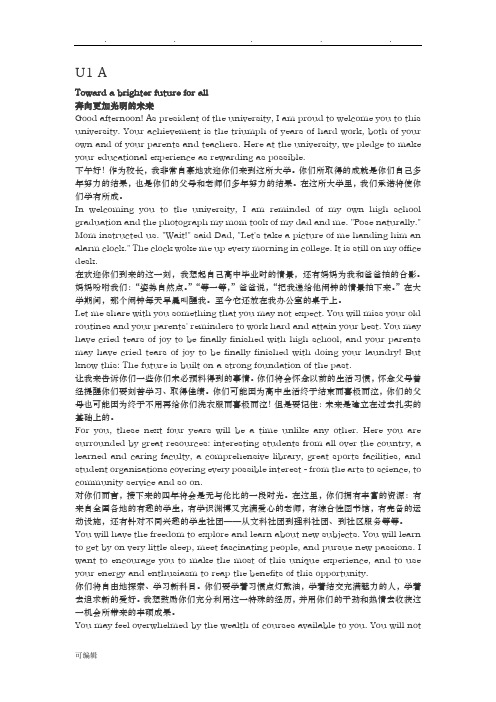
U1 AToward a brighter future for all奔向更加光明的未来Good afternoon! As president of the university, I am proud to welcome you to this university. Your achievement is the triumph of years of hard work, both of your own and of your parents and teachers. Here at the university, we pledge to make your educational experience as rewarding as possible.下午好!作为校长,我非常自豪地欢迎你们来到这所大学。
你们所取得的成就是你们自己多年努力的结果,也是你们的父母和老师们多年努力的结果。
在这所大学里,我们承诺将使你们学有所成。
In welcoming you to the university, I am reminded of my own high school graduation and the photograph my mom took of my dad and me. "Pose naturally." Mom instructed us. "Wait!" said Dad, "Let's take a picture of me handing him an alarm clock." The clock woke me up every morning in college. It is still on my office desk.在欢迎你们到来的这一刻,我想起自己高中毕业时的情景,还有妈妈为我和爸爸拍的合影。
新视野大学英语第三版Book2-unit5课文翻译

Unit 5 Section A Spend or save — The student's dilemma花钱还是存钱,学生进退维谷1 Do you feel as confused and manipulated as I do with this question, "ShouldI spend or should I save?" I think that the messages we get from our environment seem to defy common sense and contradict each other. The government tells us to spend or we'll never get out of the recession. At the same time, they tell us that unless we save more, our country is in grave danger. Banks offer higher interest rates so we increase savings. Then the same banks send us credit card offers so we can spend more.1 你是不是跟我一样对“我应该花钱还是存钱”这个问题感到困惑,且有被操纵的感觉?我觉得我们从生活的环境里所获得的信息似乎是有违常识、互相矛盾的。
政府告诉我们要花钱,否则我们将永远走不出衰退;与此同时,他们又告诉我们,除非我们节省更多的钱,否则我们的国家会处于严重危险之中。
银行提供较高的利率以增加储蓄。
然后,同样是这些银行又提供信用卡让我们可以花更多的钱。
2 Here's another familiar example: If we don't pay our credit card bill on time, we get demanding, nasty emails from the credit card company saying something like: "Your failure to pay is unacceptable. Pay immediately or you'll be in trouble!" Then, as soon as we pay, we get a follow-up email in a charming tone telling us how valuable a customer we are and encouraging us to resume spending.Which depiction is correct: a failing consumer in trouble or a valued customer? The gap between these two messages is enormous.2 这里还有一个大家熟悉的例子:如果我们不按时支付信用卡账单,我们会收到从信用卡公司发来的类似这样的令人讨厌的催缴账单的电子邮件:不还款是不可接受的。
新视野大学英语第三版读写教程第二册Unit2课文翻译

U2 AA child's clutter awaits an adult's return儿时百宝箱老大归家梦I watch her back her new truck out of the driveway. The vehicle is too large, too expensive. She'd refused to consider a practical car with good gas efficiency and easy to park. It's because of me, I think. She bought it to show me that she could. 我看着她在车道上倒着她的新卡车。
车太大,而且太贵。
她就是不愿意考虑买辆开起来省油、停起来省心的实用型汽车。
我想,原因在我。
她买这辆车就是为了让我看看她的能耐。
"I'm 18," she'd told me so often that my teeth ached. "I am an adult!"“我18 岁了,”她经常这样对我说,以至于听得我牙都疼了。
“我是成年人了!”I thought, is that true? Just yesterday you watched some cartoons. What changed between yesterday and today?我心想,真的吗?昨天你还在看动画片呢。
今天和昨天又能有多大的变化?Today she's gone, off to be an adult far away from me. I'm glad she's gone. It means she made it, and that I'm finally free of 18 years of responsibilities. And yet I wonder if she could take good care of herself.今天她走了,远离我去寻求成年人的独立。
新视野第三版大学英语第二册课文翻译
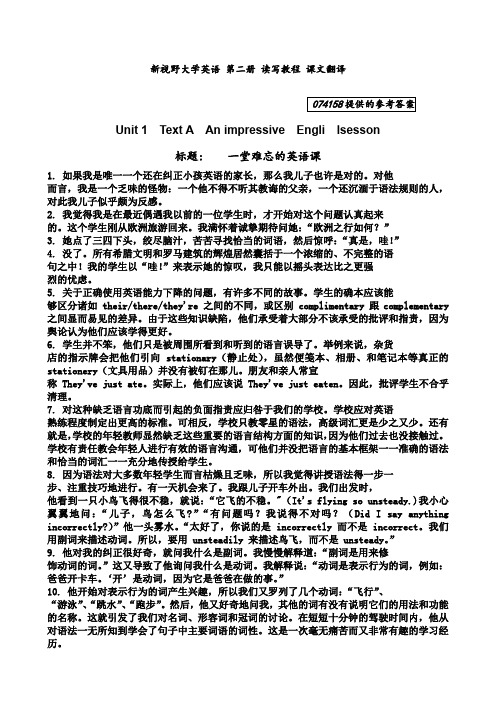
新视野大学英语第二册读写教程课文翻译Unit 1 Text A An impressive Engli lsesson标题: 一堂难忘的英语课1. 如果我是唯一一个还在纠正小孩英语的家长,那么我儿子也许是对的。
对他而言,我是一个乏味的怪物:一个他不得不听其教诲的父亲,一个还沉湎于语法规则的人,对此我儿子似乎颇为反感。
2. 我觉得我是在最近偶遇我以前的一位学生时,才开始对这个问题认真起来的。
这个学生刚从欧洲旅游回来。
我满怀着诚挚期待问她:“欧洲之行如何?”3. 她点了三四下头,绞尽脑汁,苦苦寻找恰当的词语,然后惊呼:“真是,哇!”4. 没了。
所有希腊文明和罗马建筑的辉煌居然囊括于一个浓缩的、不完整的语句之中!我的学生以“哇!”来表示她的惊叹,我只能以摇头表达比之更强烈的忧虑。
5. 关于正确使用英语能力下降的问题,有许多不同的故事。
学生的确本应该能够区分诸如 their/there/they're 之间的不同,或区别 complimentary 跟complementary 之间显而易见的差异。
由于这些知识缺陷,他们承受着大部分不该承受的批评和指责,因为舆论认为他们应该学得更好。
6. 学生并不笨,他们只是被周围所看到和听到的语言误导了。
举例来说,杂货店的指示牌会把他们引向 stationary(静止处),虽然便笺本、相册、和笔记本等真正的stationery(文具用品)并没有被钉在那儿。
朋友和亲人常宣称 They've just ate。
实际上,他们应该说 They've just eaten。
因此,批评学生不合乎清理。
7. 对这种缺乏语言功底而引起的负面指责应归咎于我们的学校。
学校应对英语熟练程度制定出更高的标准。
可相反,学校只教零星的语法,高级词汇更是少之又少。
还有就是,学校的年轻教师显然缺乏这些重要的语言结构方面的知识,因为他们过去也没接触过。
学校有责任教会年轻人进行有效的语言沟通,可他们并没把语言的基本框架一一准确的语法和恰当的词汇一一充分地传授给学生。
新视野大学英语(第三版)读写教程第(二)册课文翻译 text A

新视野大学英语第三版第二册读写课文翻译Unit 1 Text A一堂难忘的英语课1 如果我是唯一一个还在纠正小孩英语的家长,那么我儿子也许是对的。
对他而言,我是一个乏味的怪物:一个他不得不听其教诲的父亲,一个还沉湎于语法规则的人,对此我儿子似乎颇为反感。
2 我觉得我是在最近偶遇我以前的一位学生时,才开始对这个问题认真起来的。
这个学生刚从欧洲旅游回来。
我满怀着诚挚期待问她:“欧洲之行如何?”3 她点了三四下头,绞尽脑汁,苦苦寻找恰当的词语,然后惊呼:“真是,哇!”4 没了。
所有希腊文明和罗马建筑的辉煌居然囊括于一个浓缩的、不完整的语句之中!我的学生以“哇!”来表示她的惊叹,我只能以摇头表达比之更强烈的忧虑。
5 关于正确使用英语能力下降的问题,有许多不同的故事。
学生的确本应该能够区分诸如their/there/they're之间的不同,或区别complimentary 跟complementary之间显而易见的差异。
由于这些知识缺陷,他们承受着大部分不该承受的批评和指责,因为舆论认为他们应该学得更好。
6 学生并不笨,他们只是被周围所看到和听到的语言误导了。
举例来说,杂货店的指示牌会把他们引向stationary(静止处),虽然便笺本、相册、和笔记本等真正的stationery(文具用品)并没有被钉在那儿。
朋友和亲人常宣称They've just ate。
实际上,他们应该说They've just eaten。
因此,批评学生不合乎情理。
7 对这种缺乏语言功底而引起的负面指责应归咎于我们的学校。
学校应对英语熟练程度制定出更高的标准。
可相反,学校只教零星的语法,高级词汇更是少之又少。
还有就是,学校的年轻教师显然缺乏这些重要的语言结构方面的知识,因为他们过去也没接触过。
学校有责任教会年轻人进行有效的语言沟通,可他们并没把语言的基本框架——准确的语法和恰当的词汇——充分地传授给学生。
8 因为语法对大多数年轻学生而言枯燥且乏味,所以我觉得讲授语法得一步一步、注重技巧地进行。
(完整版)第三版新视野大学英语第二册课文翻译

Unit 1An impressive English lesson1 If I am the only parent who still corrects his child's English, then perhaps my son is right. To him, I am a tedious oddity: a father he is obliged to listen to and a man absorbed in the rules of grammar, which my son seems allergic to.2 I think I got serious about this only recently when I ran into one of my former students, fresh from an excursion to Europe. "How was it?" I asked, full of earnest anticipation.3 She nodded three or four times, searched the heavens for the right words, and then exclaimed, "It was, like, whoa!"4 And that was it. The civilization of Greece and the glory of Roman architecture were captured in a condensed non-statement. My student's "whoa!" was exceeded only by my head-shaking distress.5 There are many different stories about the downturn in the proper use of English. Surely students should be able to distinguish between their/there/they're or the distinctive difference between complimentary and complementary. They unfairly bear the bulk of the criticism for these knowledge deficits because there is a sense that they should know better.6 Students are not dumb, but they are being misled everywhere they look and listen. For example, signs in grocery stores point them to the stationary, even though the actual stationery items — pads, albums and notebooks —are not nailed down. Friends and loved ones often proclaim they've just ate when, in fact, they've just eaten. Therefore, it doesn't make any sense to criticize our students.7 Blame for the scandal of this language deficit should be thrust upon our schools, which should be setting high standards of English language proficiency. Instead, they only teach a little grammar and even less advanced vocabulary. Moreover, the younger teachers themselves evidently have little knowledge of these vital structures of language because they also went without exposure to them. Schools fail to adequately teach the essential framework of language, accurate grammar and proper vocabulary, while they should take the responsibility of pushing the young onto the path of competent communication.8 Since grammar is boring to most of the young students, I think that it must be handled delicately, step by step. The chance came when one day I was driving with my son. As we set out on our trip, he noticed a bird in jerky flight and said, "It's flying so unsteady." I carefully asked, "My son, how is the bird flying?" "What's wrong? Did I say anything incorrectly?" He got lost. "Great! You said incorrectly instead of incorrect. We use adverbs to describe verbs. Therefore, it's flying so unsteadily but not so unsteady."9 Curious about my correction, he asked me what an adverb was. Slowly, I said, "It's a word that tells you something about a verb." It led to his asking me what a verb was. I explained, "Verbs are action words; for example, Dad drives the truck. Drive is the verb because it's the thing Dad is doing."10 He became attracted to the idea of action words, so we listed a few more: fly, swim, dive, run. Then, out of his own curiosity, he asked me if other words had names for their use and functions. This led to a discussion of nouns, adjectives, and articles. Within the span of a 10-minute drive, he had learned from scratch to the major parts of speech in asentence. It was painless learning and great fun!11 Perhaps, language should be looked upon as a road map and a valuable possession: often study the road map (check grammar) and tune up the car engine (adjust vocabulary). Learning grammar and a good vocabulary is just like driving with a road map in a well-conditioned car.12 The road map provides the framework and guidance you need for your trip, but it won't tell you exactly what trees or flowers you will see, what kind of people you will encounter, or what types of feelings you will be experiencing on your journey. Here, the vocabulary makes the journey's true colors come alive! A good vocabulary enables you to enjoy whatever you see as you drive along. Equipped with grammar and a good vocabulary, you have flexibility and excellent control. While the road map guides your journey to your destination, an excellent vehicle helps you to fully enjoy all of the sights, sounds and experiences along the way.13 Effective, precise, and beneficial communication depends upon grammar and a good vocabulary, the two essential assets for students, but they are not being taught in schools.14 Just this morning, my son and I were eating breakfast when I attempted to add milk to my tea. "Dad," he said, "If I were you, I wouldn't do that. It's sour."15 "Oh my!" I said, swelling with pride toward my son, "That's a grammatically perfect sentence. You used were instead of was."16 "I know, I know," he said with a long agreeable sigh. "It's the subjunctive mood."17 I was, like, whoa!Translation一堂难忘的英语课1 如果我是唯一一个还在纠正小孩英语的家长,那么我儿子也许是对的。
新视野第三版大学英语第二册课文翻译

新视野大学英语第二册读写教程课文翻译Unit 1 Text A An impressive Engli lsesson标题: 一堂难忘的英语课1. 如果我是唯一一个还在纠正小孩英语的家长,那么我儿子也许是对的。
对他而言,我是一个乏味的怪物:一个他不得不听其教诲的父亲,一个还沉湎于语法规则的人,对此我儿子似乎颇为反感。
2. 我觉得我是在最近偶遇我以前的一位学生时,才开始对这个问题认真起来的。
这个学生刚从欧洲旅游回来。
我满怀着诚挚期待问她:“欧洲之行如何?”3. 她点了三四下头,绞尽脑汁,苦苦寻找恰当的词语,然后惊呼:“真是,哇!”4. 没了。
所有希腊文明和罗马建筑的辉煌居然囊括于一个浓缩的、不完整的语句之中!我的学生以“哇!”来表示她的惊叹,我只能以摇头表达比之更强烈的忧虑。
5. 关于正确使用英语能力下降的问题,有许多不同的故事。
学生的确本应该能够区分诸如 their/there/they're 之间的不同,或区别 complimentary 跟complementary 之间显而易见的差异。
由于这些知识缺陷,他们承受着大部分不该承受的批评和指责,因为舆论认为他们应该学得更好。
6. 学生并不笨,他们只是被周围所看到和听到的语言误导了。
举例来说,杂货店的指示牌会把他们引向 stationary(静止处),虽然便笺本、相册、和笔记本等真正的 stationery(文具用品)并没有被钉在那儿。
朋友和亲人常宣称 They've just ate。
实际上,他们应该说 They've just eaten。
因此,批评学生不合乎清理。
7. 对这种缺乏语言功底而引起的负面指责应归咎于我们的学校。
学校应对英语熟练程度制定出更高的标准。
可相反,学校只教零星的语法,高级词汇更是少之又少。
还有就是,学校的年轻教师显然缺乏这些重要的语言结构方面的知识,因为他们过去也没接触过。
学校有责任教会年轻人进行有效的语言沟通,可他们并没把语言的基本框架一一准确的语法和恰当的词汇一一充分地传授给学生。
新视野大学英语第三版第二册Unit2课文原文+翻译
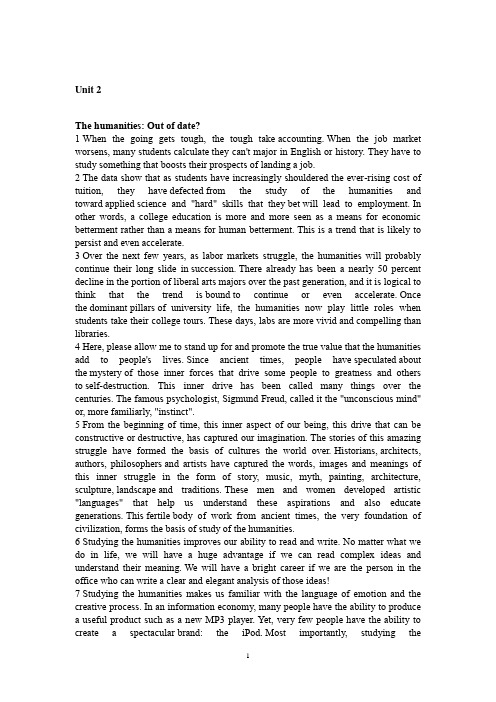
Unit 2The humanities: Out of date?1When the going gets tough, the tough take accounting.When the job market worsens, many students calculate they can't major in English or history.They have to study something that boosts their prospects of landing a job.2The data show that as students have increasingly shouldered the ever-rising cost of tuition, they have defected from the study of the humanities and toward applied science and "hard" skills that they bet will lead to employment.In other words, a college education is more and more seen as a means for economic betterment rather than a means for human betterment.This is a trend that is likely to persist and even accelerate.3Over the next few years, as labor markets struggle, the humanities will probably continue their long slide in succession.There already has been a nearly 50 percent decline in the portion of liberal arts majors over the past generation, and it is logical to think that the trend is bound to continue or even accelerate.Once the dominant pillars of university life, the humanities now play little roles when students take their college tours.These days, labs are more vivid and compelling than libraries.4Here, please allow me to stand up for and promote the true value that the humanities add to people's lives.Since ancient times, people have speculated about the mystery of those inner forces that drive some people to greatness and others to self-destruction. This inner drive has been called many things over the centuries.The famous psychologist,Sigmund Freud, called it the "unconscious mind" or, more familiarly, "instinct".5From the beginning of time, this inner aspect of our being, this drive that can be constructive or destructive, has captured our imagination.The stories of this amazing struggle have formed the basis of cultures the world over.Historians,architects, authors, philosophers and artists have captured the words, images and meanings of this inner struggle in the form of story, music, myth, painting, architecture, sculpture,landscape and traditions.These men and women developed artistic "languages" that help us understand these aspirations and also educate generations.This fertile body of work from ancient times, the very foundation of civilization, forms the basis of study of the humanities.6Studying the humanities improves our ability to read and write.No matter what we do in life, we will have a huge advantage if we can read complex ideas and understand their meaning.We will have a bright career if we are the person in the office who can write a clear and elegant analysis of those ideas!7Studying the humanities makes us familiar with the language of emotion and the creative process.In an information economy, many people have the ability to produce a useful product such as a new MP3 player.Yet, very few people have the ability to create a spectacular brand: the iPod.Most importantly, studying thehumanities invests us with great insight and self-awareness,there by releasing our creative energy and talent in a positive and constructive manner.8Perhaps the best argument in favor of the humanities is the scope of possibilities that are widely open to us.Did you know that James Cameron, world-famous director of the movie,Titanic, graduated with a degree in the humanities?So did Sally Ride, the first woman in space.So did actors Bruce Lee,Gwyneth Paltrow,Renee Zellweger and Matt Damon.Dr.Harold Varmus, who won a Nobel Prize for Medicine, studied the humanities.Even Michael Eisner, Chairman of the Disney Company, majored in the humanities. Famous people who studied the humanities make a long list indeed.It's easy to see that the humanities can prepare us for many different careers and jobs we can undertake, whether medicine, business, science or entertainment.If we study only mathematics, it's likely we will be a candidate only for jobs as a mathematician.If we include studying the humanities, we can make breakthroughs on many barriers and are limited only by our effort and imagination.9Of course, nowadays, if we study the humanities alone, we are liable to miss many opportunities.Each one of us needs to become as technically and professionally skilled as possible to help meet the needs of modern life.In fact, increasingly a pairing of technical knowledge and inner insight is seen as the ideal in the establishment of a career.If I were the Dean of Admissions at a medical school and two people applied to our school, both having the required basic scientific courses, one a philosophy major and the other solely a pre-med student, the philosophy applicant would be chosen.10In summary, the humanities help to create well-rounded human beings with insight and understanding of the passions, hopes and dreams common to all humanity.The humanities, the ancient timeless reservoir of knowledge, teach us to see things differently and broaden our horizons.They are as useful and relevant in our modern age as they have always been.Doesn't it make sense to spend some time in the company of the humanities, our outstanding and remarkable treasure of knowledge?Who knows how famous YOU might become!Translation人文学科:过时了吗?1 当形势变得困难时,强者会去选学会计。
新视野大学英语第三版读写教程第二册Unit1课文翻译

U1 AToward a brighter future for all奔向更加光明的未来Good afternoon! As president of the university, I am proud to welcome you to this university. Your achievement is the triumph of years of hard work, both of your own and of your parents and teachers. Here at the university, we pledge to make your educational experience as rewarding as possible.下午好!作为校长,我非常自豪地欢迎你们来到这所大学。
你们所取得的成就是你们自己多年努力的结果,也是你们的父母和老师们多年努力的结果。
在这所大学里,我们承诺将使你们学有所成。
In welcoming you to the university, I am reminded of my own high school graduation and the photograph my mom took of my dad and me. "Pose naturally." Mom instructed us. "Wait!" said Dad, "Let's take a picture of me handing him an alarm clock." The clock woke me up every morning in college. It is still on my office desk.在欢迎你们到来的这一刻,我想起自己高中毕业时的情景,还有妈妈为我和爸爸拍的合影。
- 1、下载文档前请自行甄别文档内容的完整性,平台不提供额外的编辑、内容补充、找答案等附加服务。
- 2、"仅部分预览"的文档,不可在线预览部分如存在完整性等问题,可反馈申请退款(可完整预览的文档不适用该条件!)。
- 3、如文档侵犯您的权益,请联系客服反馈,我们会尽快为您处理(人工客服工作时间:9:00-18:30)。
新视野大学英语第二册读写教程课文翻译Unit 1 Text A An impressive Engli lsesson标题: 一堂难忘的英语课1. 如果我是唯一一个还在纠正小孩英语的家长,那么我儿子也许是对的。
对他而言,我是一个乏味的怪物:一个他不得不听其教诲的父亲,一个还沉湎于语法规则的人,对此我儿子似乎颇为反感。
2. 我觉得我是在最近偶遇我以前的一位学生时,才开始对这个问题认真起来的。
这个学生刚从欧洲旅游回来。
我满怀着诚挚期待问她:“欧洲之行如何?”3. 她点了三四下头,绞尽脑汁,苦苦寻找恰当的词语,然后惊呼:“真是,哇!”4. 没了。
所有希腊文明和罗马建筑的辉煌居然囊括于一个浓缩的、不完整的语句之中!我的学生以“哇!”来表示她的惊叹,我只能以摇头表达比之更强烈的忧虑。
5. 关于正确使用英语能力下降的问题,有许多不同的故事。
学生的确本应该能够区分诸如 their/there/they're 之间的不同,或区别 complimentary 跟complementary 之间显而易见的差异。
由于这些知识缺陷,他们承受着大部分不该承受的批评和指责,因为舆论认为他们应该学得更好。
6. 学生并不笨,他们只是被周围所看到和听到的语言误导了。
举例来说,杂货店的指示牌会把他们引向 stationary(静止处),虽然便笺本、相册、和笔记本等真正的 stationery(文具用品)并没有被钉在那儿。
朋友和亲人常宣称 They've just ate。
实际上,他们应该说 They've just eaten。
因此,批评学生不合乎清理。
7. 对这种缺乏语言功底而引起的负面指责应归咎于我们的学校。
学校应对英语熟练程度制定出更高的标准。
可相反,学校只教零星的语法,高级词汇更是少之又少。
还有就是,学校的年轻教师显然缺乏这些重要的语言结构方面的知识,因为他们过去也没接触过。
学校有责任教会年轻人进行有效的语言沟通,可他们并没把语言的基本框架一一准确的语法和恰当的词汇一一充分地传授给学生。
8. 因为语法对大多数年轻学生而言枯燥且乏味,所以我觉得讲授语法得一步一步、注重技巧地进行。
有一天机会来了。
我跟儿子开车外出。
我们出发时,他看到一只小鸟飞得很不稳,就说:“它飞的不稳。
"(It's flying so unsteady.)我小心翼翼地问:“儿子,鸟怎么飞?”“有问题吗?我说得不对吗?(Did I say anything incorrectly?)”他一头雾水。
“太好了,你说的是 incorrectly 而不是 incorrect。
我们用副词来描述动词。
所以,要用 unsteadily 来描述鸟飞,而不是 unsteady。
”9. 他对我的纠正很好奇,就问我什么是副词。
我慢慢解释道:“副词是用来修饰动词的词。
”这又导致了他询问我什么是动词。
我解释说:“动词是表示行为的词,例如:爸爸开卡车。
‘开’是动词,因为它是爸爸在做的事。
”10. 他开始对表示行为的词产生兴趣,所以我们又罗列了几个动词:“飞行”、“游泳”、“跳水”、“跑步”。
然后,他又好奇地问我,其他的词有没有说明它们的用法和功能的名称。
这就引发了我们对名词、形容词和冠词的讨论。
在短短十分钟的驾驶时间内,他从对语法一无所知到学会了句子中主要词语的词性。
这是一次毫无痛苦而又非常有趣的学习经历。
11. 也许,语言应该被看成是一张路线图和一件珍品:我们要常常查看路线图(核对语法)和调整汽车的引擎(调节词汇)。
学好语法和掌握大量的词汇就好比拿着路线图在车况良好的车里驾驶。
12. 路线图为你的旅行提供所需的基本路线和路途指南,可是它不会告诉你一路上你究竟会看见什么树或什么花,你会遇见什么样的人,或会有什么样的感受。
这里,词汇会使你的旅途变得五彩缤纷、栩栩如生。
大量的词汇让你享受到开车途中所见的点点滴滴。
借助语法和丰富的词汇,你就有了灵活性,掌控自如。
路线图会把你带到目的地,而一台好车却能让你完全陶醉于旅途的所有景色、声音及经历之中。
13. 对学生来说,有效、准确且富有成效的沟通技能取决于语法和词汇这两大有利条件,可是学校并没有教他们这些。
14. 就在今天早上,我跟儿子吃早饭时,我想把牛奶加入我的茶里。
“爸爸,”他说,“如果我是你的话,我不会这样做。
牛奶会变酸。
(If I were you, I wouldn't do that. It's sour.)15. “哦,上帝!”我满怀着无比的骄傲说道,“这是一个语法完全正确的句子。
你用了 were 而不是 was。
”16. “我知道,我知道,”他愉悦地舒了口气,“这是虚拟语气!”17. 这下轮到我“哇!”了。
Unit 2 Section A The humanities: Out of date?人文学科:过时了吗?1 When the going gets tough, the tough take accounting. When the job market worsens, many students calculate they can't major in English or history. They have to study something that boosts their prospects of landing a job.1 当形势变得困难时,强者会去选学会计。
当就业市场恶化时,许多学生估算着他们不能再主修英语或历史。
他们得学一些能改善他们就业前景的东西。
2 The data show that as students have increasingly shouldered the ever-rising cost of tuition, they have defected from the study of the humanities and toward applied science and "hard" skills that they bet will lead to employment. In other words, a college education is more and more seen as a means for economic betterment rather than a means for human betterment. This is a trend that is likely to persist and even accelerate.2 数据显示,随着学生肩负的学费不断增加,他们已从学习人文学科转向他们相信有益于将来就业的应用科学和“硬”技能。
换言之,大学教育越来越被看成是改善经济而不是提升人类自身的手段。
这种趋势可能会持续,甚至有加快之势。
3 Over the next few years, as labor markets struggle, the humanities willprobably continue their long slide in succession. There already has been a nearly 50 percent decline in the portion of liberal arts majors over the past generation, and it is logical to think that the trend is bound to continue or even accelerate. Once the dominant pillars of university life, the humanities now play little roles when students take their college tours. These days, labs are more vivid and compelling than libraries.3 在未来几年内,由于劳动力市场的不景气,人文学科可能会继续其长期低迷的态势。
在上一代大学生中,主修文科的学生数跌幅已近 50%。
这种趋势会持续、甚至加速的想法是合情合理的。
人文学科曾是大学生活的重要支柱,而今在学生们的大学游中却只是一个小点缀。
现在,实验室要比图书馆更栩栩如生、受人青睐。
4 Here, please allow me to stand up for and promote the true value that the humanities add to people's lives. Since ancient times, people have speculated about the mystery of those inner forces that drive some people to greatness and others to self-destruction. This inner drive has been called many things over the centuries. The famous psychologist, Sigmund Freud, called it the "unconscious mind" or, more familiarly, "instinct".4 在这儿,请允许我为人文学科给人们的生活所增添的真实价值进行支持和宣传。
自古以来,人们一直在思索人类自身具有什么神奇的内力使一些人变得崇高伟大,而使另一些人走向自我毁灭。
几个世纪以来,这股内力被称作很多东西。
着名的心理学家西格蒙德·弗洛伊德称之为“潜意识”,或更为人熟知的“本能”。
5 From the beginning of time, this inner aspect of our being, this drive that can be constructive or destructive, has captured our imagination. The stories of this amazing struggle have formed the basis of cultures the world over. Historians, architects, authors, philosophers and artists have captured the words, images and meanings of this inner struggle in the form of story, music, myth, painting, architecture, sculpture, landscape and traditions. These men and women developed artistic "languages" that help us understand these aspirations and also educate generations. This fertile body of work from ancient times, the very foundation of civilization, forms the basis of study of the humanities.5 从一开始,人类这股可以是建设性也可以是毁灭性的内在驱动力,就令我们心驰神往。
